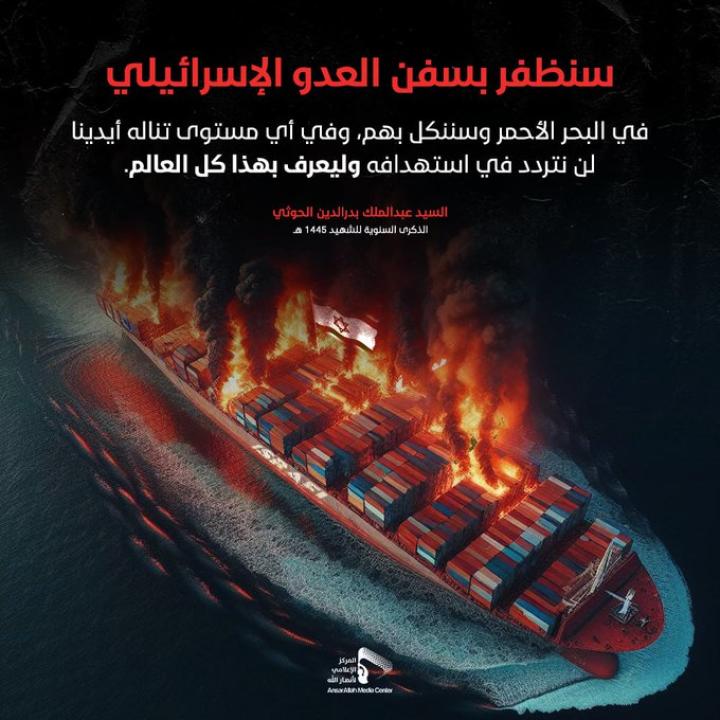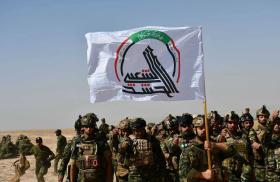
Containing the Houthis in Yemen: Issues and Options for the Policy Review

During the Gaza war, Houthi militia forces have emerged as the most risk-acceptant member of Iran's "axis of resistance" and a demonstrated menace to international freedom of navigation.
Since the October 7 Hamas assault on Israel, it has been Yemen’s Houthis—not Lebanese Hezbollah—who have made the war's first attempts to strike critical Israeli infrastructure with Iranian-provided advanced conventional munitions. So far, they have launched at least two medium-range ballistic missiles at Israel, something no enemy has done since Saddam Hussein hit the country with Scuds in 1991, and something Iran itself has never done. The Houthis have also launched at least eight salvos of cruise missiles and long-range explosive drones at Israel, focused on the southern port of Eilat.
In addition, Houthi forces have shot down one U.S. MQ-9 Reaper drone during the crisis, and numerous missiles and drones have been routed in close proximity to U.S. Navy vessels. Civilian container ships have been targeted as well: one was seized by helicopter-borne Houthi commandos, and three more were struck by antiship missiles in the Red Sea on December 3 alone.
The following is drawn from a forthcoming Washington Institute study on the wider challenge posed by the Houthis, who have been the de facto rulers of Sanaa and much of northern Yemen since their coup against the UN-backed government eight years ago. If Houthi capabilities are further developed, they may give Iran, Hezbollah, and the broader "axis of resistance" a new piece to use on the chessboard of their deterrent strategy.
The forthcoming study also aims to help U.S. policymakers and analysts better understand why the Houthis would take such risks on behalf of Hamas and Iran. The short answer is that the Houthis are neither Iranian proxies nor wartime partners of convenience. According to sound evidence accumulated by a years-spanning research effort, the Houthi-Iran relationship should not be viewed as one of necessity, but rather as a strong, deep-rooted alliance underpinned by tight ideological affinity and geopolitical alignment. The emergence of a "southern Hezbollah" in Yemen is arguably now a fact on the ground.
Even as the United States seeks a peace accord in Yemen, this reality should prompt Washington to develop a pragmatic policy of containing and, ideally, diminishing Houthi military and political power. Positioned astride some of the most strategically important maritime lanes in the world, Yemen will matter greatly to the United States (and its adversaries) in the future and should not be allowed to fall entirely under the control of a southern Hezbollah. The following policies are especially worth considering:
- Undertake a realistic reappraisal of the Houthi movement. In the understandable desire to end the war in Yemen, Washington has arguably overlooked a disconcerting development in the regional security affairs of the Middle East, namely, the emergence of a powerful new military actor in Yemen’s Houthi movement, which might be thought of as a kind of non-nuclear North Korea—an insular, aggressive, well-armed player that hostile to the United States and sitting on key geography. Washington should be clear-eyed that the current peace is unlikely to hold, since the Houthis are an expansionist and paranoid rising power with deep animosity toward Saudi Arabia, Israel, and the United States. Washington should also recognize that Iran and the Houthis share a remarkably similar worldview; they cannot be separated.
- Support free Yemen just as we supported South Korea. The deeply flawed military campaign that the Saudi-led coalition began in 2015 achieved a result similar to that of the Korean War, allowing the south of the country to avoid being overrun by the north. Logically, then, the non-Houthi area should be supported, militarily and economically, much as an initially non-democratic South Korea was supported until it eventually became defensively sound, economically successful, and more democratic. Yemen does not have to be formally reunified, but the anti-U.S. forces in the north must not be allowed to snuff out their opposition in the south and east. In addition to ensuring a fair peace deal, the United States must take concrete steps to enforce the UN arms embargo and prevent destabilizing shifts in the military balance of power that could restart the war.
- Build up the military defenses of non-Houthi Yemen. Ensuring that the Houthis cannot overrun more areas of Yemen, particularly the oil- and gas-rich province of Marib, will require U.S.-assisted prevention and deterrence efforts. This will also help regional players and the United States avoid being drawn into another conflict. As with North Korea, militarily deterring and containing the Houthis will be a defensive mission—one that prevents the Houthis from scenting weakness or opportunity and assures them that they would stand a significant chance of failing and being punished heavily if they attack again. Toward that end, the United States should provide intelligence warnings and logistical and planning support to non-Houthi factions as they practice rapid deployments from one front to another—an approach that will also boost their defensive resilience.
- Reestablish deterrence. The Gaza war has underlined that America has no good answer for how to deter the Houthis, which is not a sustainable state of affairs for a superpower that prides itself on being the guarantor of global sea-lanes. In the current crisis, neither Israel nor the United States has militarily deterred the Houthis from taking destabilizing actions. The group has a high pain threshold after decades of war, though it does seem to be sensitive about certain targets: namely, Houthi leaders; drone and missile storage sites; irreplaceable helicopters and fixed-wing aircraft; Iranian and Hezbollah specialists and advisors; liquid-fuel systems and storage; and the antiship capabilities they have built, including "motherships" and "spy dhows" operating far from Houthi-held areas. Covert action might be the most effective way to target these assets without drawing retaliation.
- Economically bolster free Yemen. As with postwar South Korea, the non-Houthi areas of Yemen need to be strengthened economically if they are to survive. Specifically, the United should help them reactivate key projects such as the Yemen Liquefied Natural Gas (YLNG) initiative and oil exports, whose outputs may be shared with the population of Houthi-held areas if and when the group demonstrates a sustained period of non-aggression toward international players. In the meantime, the United States should throw its full weight behind Gulf efforts to strengthen energy, logistics, and trade in non-Houthi areas.
- Enforce weapons embargoes on the Houthis. Authorities should vigorously enforce both the existing UN arms embargo on the Houthis and the U.S., UN, and European Union sanctions on Iran’s military exports. The Houthis are increasing their missile salvos against Israel because they have no fear that their resupply route will be cut. The medium-range ballistic missiles that Iran has smuggled into Yemen are capable of reaching Israel, and neither U.S.-led maritime patrolling nor the weak UN inspections regime have been able to stop these transfers, underlining the ineffectiveness of the current approach. Washington should support the Gulf states in seeking to prevent direct air freight and passenger flights between Yemen and four key states: Iran, Iraq, Lebanon, and Syria.
- Build a containment coalition. The Gaza war has quietly focused all Red Sea players—Saudi Arabia, Egypt, Jordan, and Israel—on greater cooperation against Houthi ballistic missiles, cruise missiles, drone capabilities, and attacks on shipping. This is fertile ground for the creation of what David Schenker called “a multilateral Red Sea security mechanism.” Washington should also quietly convene a closed-door meeting of this Red Sea security quartet and develop medium-term plans for southward-facing defensive cooperation. If there has been a bright spot in the current Gaza war, it has been the highly effective effort to counter Houthi missiles and drones, led by the United States but leveraging the assets of Saudi Arabia and Israel as well.
- Build a wall of sanctions, not a “one and done” re-designation. Instead of a blanket re-designation of the Houthi Ansar Allah movement as a Foreign Terrorist Organization under Executive Order 13224, Washington should break up the designation into smaller packages against individual leaders, agencies, and businesses. This could give authorities more flexibility to link sanctions to individual negative actions. One option would be designating various Houthi leaders under Executive Order 13611, the authority used for blocking the property of individuals who threaten “the peace, security, or stability of Yemen.” In addition, Global Magnitsky sanctions could be used to highlight the movement’s egregious human rights violations.




